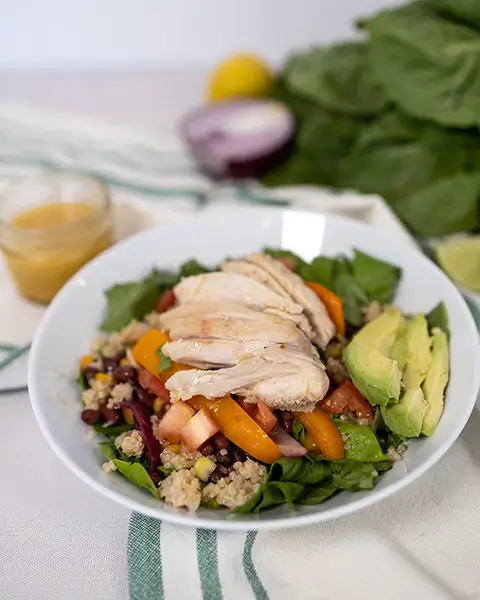If you’ve tried probiotics, antimicrobials, or strict elimination diets and you’re still dealing with daily bloating, you’re not alone. I hear this story all the time: women who have spent months or even years cutting out foods, following gut-healing protocols, or taking supplement after supplement, only to feel like nothing has truly changed. It’s exhausting, and it can make you wonder if feeling bloated and uncomfortable is just your “normal.”
The truth is, it’s not your fault and it doesn’t mean you’ve failed. Most of the conventional approaches focus on killing off bacteria, eliminating food groups, or piling on more pills. What they often miss are the foundations that actually allow your gut to work the way it’s supposed to. These foundations aren’t glamorous or trendy, but they’re the reason why all those other strategies may not have worked. When you start supporting your body at this level, the bloating that felt impossible to fix can finally start to shift.
Food Variety and Gut Health
Eating for your gut isn’t just about what foods you avoid, it’s about how many different foods you include. One of the simplest but most powerful ways to improve digestion is by giving your gut bacteria a wide range of fibers and nutrients to feed on. The more variety you eat, the more balanced and resilient your microbiome becomes, which means less bloating, better immunity, and stronger overall health.
Your gut thrives on diversity. When you eat the same handful of foods week after week, you limit the fiber types your gut bacteria need to flourish. Research shows that dietary variety is one of the strongest predictors of microbiome health. Without it, bloating, imbalances, and even food reactions are more likely. Beneficial strains like Akkermansia and Bifidobacteria rely on prebiotic fibers from a range of plants, and without those inputs, you risk losing these keystone strains that protect your gut lining and resilience.
The good news is that it doesn’t have to be complicated. Simple swaps go a long way. If blueberries are your go-to, swap in raspberries. If spinach is always in your cart, try arugula or bok choy. Eating seasonally is one of the easiest ways to naturally add variety while keeping meals simple.
The Role of Minerals in Digestion
When it comes to bloating, most people don’t think about minerals, but they’re often the missing link. Minerals are the spark plugs for your body, powering everything from enzyme function to muscle contractions in your gut. Without them, digestion slows, energy drops, and no amount of probiotics or protocols will fully solve the problem.
Minerals fuel your body
Minerals fuel every system in your body. They regulate enzymes, hormones, energy production, and gut motility. Without enough magnesium, potassium, or sodium, your digestion simply can’t run smoothly.
Signs of depletion
Constipation, sluggish motility, fatigue, hair loss, and hormone issues are common red flags of mineral depletion. Stress, restrictive dieting, and busy seasons of life often drain these resources quickly.
Easy ways to add minerals
A daily mineral drink with sea salt and cream of tartar is a simple start (PS: If you haven’t downloaded my free mineral guide, you can do so here!). Magnesium-rich foods or an Epsom salt bath can also help. Even small changes like salting food generously or using a mineral-rich electrolyte powder can make a difference.
Supporting Digestion from the Top Down
Digestion begins in the stomach, and when stomach acid is low, the pancreas and bile don’t get the right signals to release enzymes. Instead of breaking down properly, food ferments, which leads to gas, bloating, and nutrient gaps. Low stomach acid is often at the root of issues like H. pylori infections, recurrent SIBO, poor bile flow, and nutrient deficiencies which are problems that keep bloating around even after gut protocols or antimicrobials.
The good news is that supporting stomach acid doesn’t have to be complicated. Slow down at meals, chew your food thoroughly, and sip ginger tea before eating. Digestive bitters or enzymes may also help with practitioner guidance. Sometimes the smallest habits make the biggest difference in how your digestion feels.
The Missing Stress Connection
When your nervous system is stuck in fight-or-flight, blood flow is diverted away from digestion. This lowers stomach acid, slows motility, and triggers more bloating. Stress alone can be the reason you feel bloated despite changing your diet. Calming the nervous system with deep breathing, humming, or simply eating without distractions can help your body get back into “rest and digest.”
Moving Past “I’ve Tried Everything”
If you’re still bloated after trying every diet or supplement, it may be because the foundations haven’t been addressed. Food variety, minerals, upper GI support, and nervous system regulation are the missing pieces that finally make protocols work. Start with one small change this week and notice how your digestion responds. And if you want an easy way to begin, grab my free mineral guide for practical tips and recipes to help you replenish one of the biggest game-changers for bloating relief.
If you are ready to finally tackle your GI issues with custom 1:1 support, the gutTogether® program is perfect for you. You can learn more & apply here.








